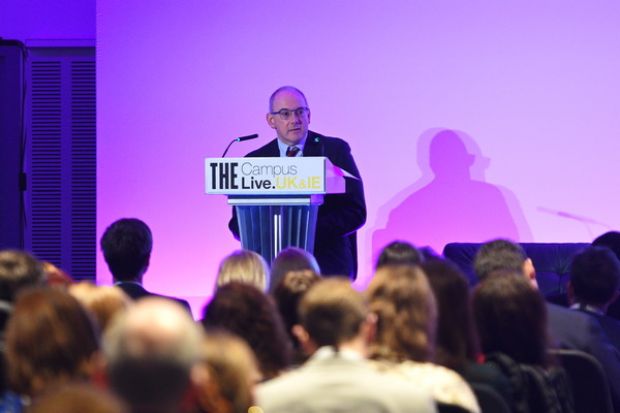Vice-chancellors must be “proactive, not just reactive” in combating the “horrific” antisemitism that is being seen on some English university campuses, according to the higher education minister.
Robert Halfon told Times Higher Education’s THE Campus Live event in Liverpool that “action against antisemitism needs to come from within” as he highlighted the experiences of Jewish students during the Israel-Hamas war.
“The antisemitism in some of our universities this autumn has been horrific,” he said, adding that he had been “horrified” to hear about incidents that he said included “threatening door-knocking, verbal and physical abuse, graffiti [and] flags draped over Jewish students’ cars”.
“I have welcomed statements condemning antisemitism from vice-chancellors across the country. But I would ask everybody in the university sector to be proactive, not just reactive,” Mr Halfon said.
“That’s why the secretary of state [for education] and I have written twice to universities on this. And why we’re looking to introduce an antisemitism charter to give teeth to the IHRA Working Definition of Antisemitism.”
Mr Halfon told university leaders that “no Jewish student should be fearful of walking through campus. There shouldn’t be an invisible ghetto created where Jewish students stay at home, frightened to enjoy campus life.
“Government can only do so much…action against antisemitism needs to come from within,” he added.
Universities across the UK have come under pressure to balance student welfare with protecting academic freedom since the current conflict began on 7 October with the Hamas attacks on Israel.
In a move that was criticised by university leaders as overreach, Michelle Donelan, the science minister, called for the country’s main research funder, UK Research and Innovation, to shut down its equality committee in response to comments made on social media by some of its members.
Speaking to THE after his speech, Mr Halfon said Ms Donelan had “done the right thing”.
“We have to give a signal that we will not tolerate antisemitism in any shape or form – not just with the law but also with the spirit of the law,” he said.
He said he had started calling vice-chancellors directly when he received reports of Jewish students feeling intimidated or threatened.
Mr Halfon said he could not “force vice-chancellors to do anything” but he found the situation “absolutely morally disgusting”.
In a wide-ranging speech, Mr Halfon reflected on his own experience in higher education as a student at the University of Exeter, which “taught me not just to highly value higher education – but to cherish it”.
He said he recognised “the financial pressures universities are under – and appreciate the work you are doing to manage these and deliver outstanding outcomes for young people”.
“We’re working in a very challenging financial context across government. This means we must continue to make tough decisions to control public spending – but also try to help students with the cost of living, and ensure they receive value for money.”
He said the government’s reforms of higher education were focused on achieving “social justice” and that meant “all courses that cost this much should have good continuation, completion and progression”.
“Why should only those in the know, who apply for the right courses, go on to reap the greatest rewards from their HE investment while others paying the same money receive poorer teaching with poorer outcomes?” the minister asked.
“Everyone should be able to approach this market clear-eyed about what they can expect for their time and money.”
Discussing changes due to come in next year that will cap the cost of foundation years in classroom-based subjects at £5,760 – down from the current £9,250 – Mr Halfon said the government had been “concerned that lower delivery cost, rather than student need”, was driving the growth in this area of provision and the “lower fee limit represents a fairer deal for students”.




